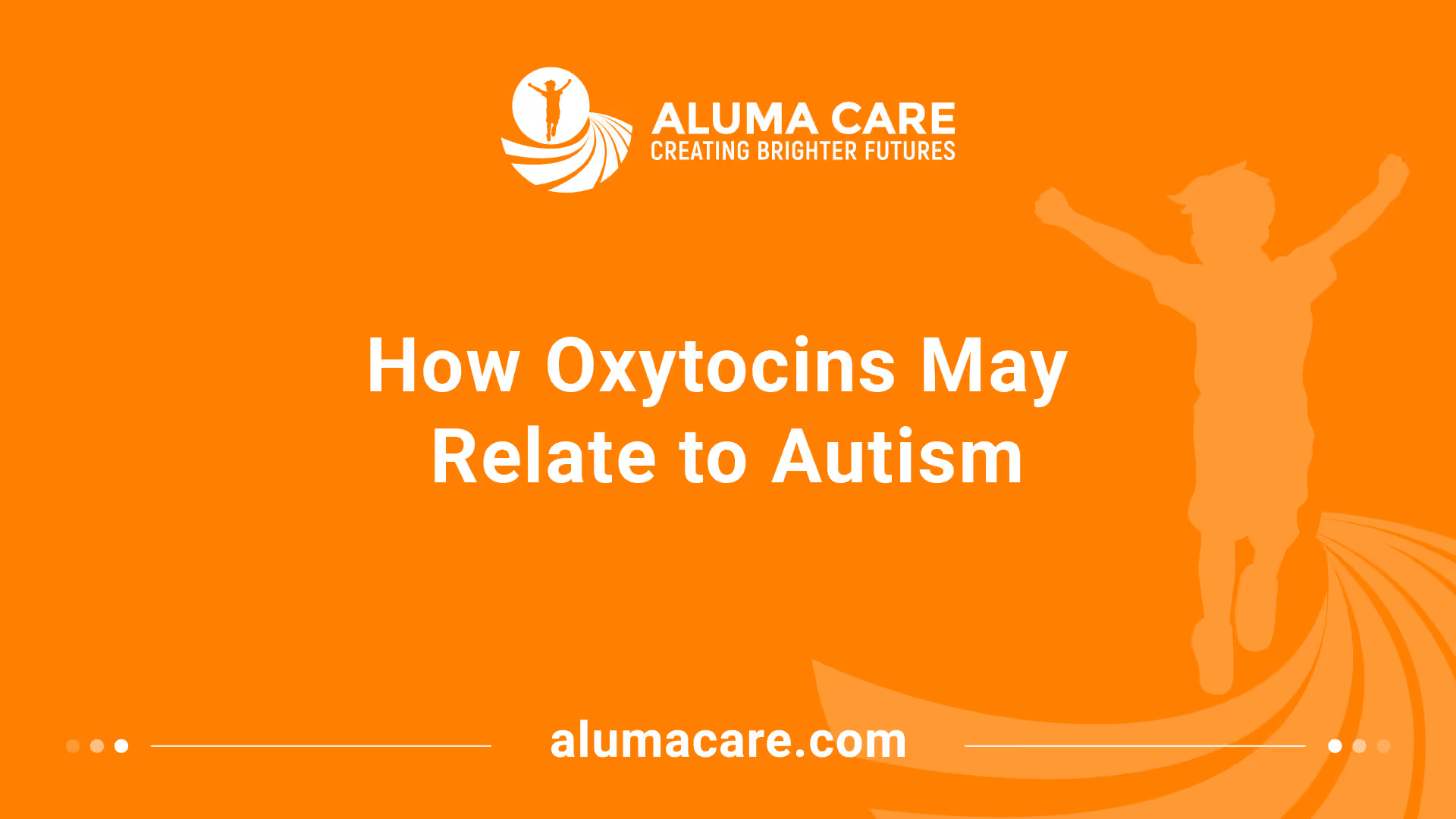
Understanding Oxytocin in Autism
Oxytocin, often referred to as the "love hormone," has gained attention for its potential connection to autism. Understanding its implications in social behaviors and the benefits it might provide can shed light on its role in Autism Spectrum Disorders (ASD).
Implications of Oxytocin in Social Deficits
Research indicates that oxytocin may be linked to the social deficits commonly observed in individuals with autism. This hormone is known to promote bonds, such as the mother-infant relationship. Individuals with high-functioning autism spectrum disorders (HF-ASD) often experience challenges in understanding social cues and responding appropriately. These impairments include difficulties in grasping others' intentions, which can further complicate social interactions [1].
Social Deficit AreaDescriptionUnderstanding Social CuesImpaired ability to interpret non-verbal communication and social signals.Responding to Social IntentionsChallenges in recognizing and responding to the motives behind others' actions.
Benefits of Oxytocin in Autism
On a more positive note, oxytocin has been shown to promote enhanced social behavior among patients with autism. Studies indicate that oxytocin can improve social interactions, leading to increased engagement with others and longer gaze durations on facial regions, particularly the eyes.
Moreover, administering oxytocin to individuals with HF-ASD has produced notable improvements in social behaviors. These included increased interactions with socially cooperative partners, heightened feelings of trust, and an increased focus on the eye area during visual scanning tasks.
Current findings suggest that oxytocin may help address social motivation deficits in ASD and may aid in developing joint attention skills, which are crucial for social engagement. Enhancements in social cognitive tasks have been observed in both individuals with ASD and their typically developing peers when oxytocin is administered.
Benefit of OxytocinDescriptionEnhanced Social BehaviorImproved interactions and willingness to engage with others.Increased Trust and PreferenceGreater feelings of safety and preference towards social partners.Focus on Eye RegionEnhanced gaze directed towards socially informative areas of the face.
Understanding the link between oxytocin and autism provides insight into potential therapeutic approaches. As this field of research continues to evolve, the implications of oxytocin on social behavior in autism warrant further exploration. For additional information regarding autism, explore topics such as autism and schizophrenia or history & timeline of autism.
Oxytocin and Social Behavior
Oxytocin plays a significant role in social behavior, particularly for individuals with autism. Research has demonstrated its potential in improving social interactions and enhancing social cognitive tasks.
Improving Social Interactions
Studies indicate that oxytocin administration promotes more appropriate social behaviors and affect in individuals with autism. It has been shown to enhance interactions with others by increasing gaze time on socially informative areas of the face, especially the eyes. For instance, individuals with high-functioning autism spectrum disorder (HF-ASD) exhibited improved social behaviors, which included:
This suggests that oxytocin could serve as a valuable tool in fostering social connections, allowing individuals with autism to engage more effectively with their peers.
Enhancing Social Cognitive Tasks
Beyond improving interactions, oxytocin has also shown promise in enhancing social cognitive tasks. It has been associated with notable improvements in specific areas, including:
These abilities are crucial for navigating social situations, and oxytocin can help bridge the gap for individuals with autism by mediating social cognitive deficits.
The administration of oxytocin has been linked to improved performance on various social tasks, which highlights its potential contribution to addressing social challenges associated with autism. As researchers explore the oxytocins link to autism, the findings may lead to new therapeutic approaches to support social development in individuals affected by autism.
Oxytocin Levels in Autism
Understanding the relationship between oxytocin levels and autism spectrum disorder (ASD) is a crucial area of research. In particular, the differences in oxytocin levels among individuals with autism compared to neurotypical individuals, as well as potential correlations with ASD symptoms, provide valuable insights into this complex disorder.
Differences in Oxytocin Levels
Research indicates that individuals with autism typically have lower oxytocin levels in their blood plasma compared to non-autistic counterparts. A study found that children diagnosed with ASD specifically displayed altered oxytocin levels after a mildly stressful social interaction. In the morning, children with autism exhibited diminished oxytocin levels, whereas the control group showed higher levels associated with better stress regulation.
GroupMorning Oxytocin LevelsAfternoon Oxytocin LevelsChildren with ASDLowerIncreasedControl ChildrenHigherSteady
Moreover, while significant differences in oxytocin levels have been observed among ASD individuals and neurotypical individuals, there has been some reporting of higher levels of an alternate peptide form of oxytocin in the former group. This complexity in oxytocin level variation underscores the need for further exploration.
Correlations with ASD Symptoms
Despite documented differences in oxytocin levels between groups, research has shown no consistent correlations between the severity of ASD symptoms and morning or afternoon oxytocin levels among children with autism. However, a noteworthy correlation emerged within the control group. In this group, higher afternoon oxytocin levels correlated with increased social competencies and school performance, as measured by ratings on the Child Behavior Checklist (CBCL) [4].
GroupMorning Oxytocin & ASD SeverityAfternoon Oxytocin & Social CompetenceChildren with ASDNo relationshipN/AControl ChildrenN/APositive correlation
The intricate dynamics between oxytocin levels and autism symptoms merit ongoing investigation to clarify the potential implications for treatment and support strategies. Understanding these relationships represents a step toward recognizing how the oxytocins link to autism.
Genetic Studies and Oxytocin Receptors
Oxytocin Receptor Gene Correlations
Research has indicated a significant relationship between the oxytocin receptor gene (OXTR) and autism spectrum disorders (ASD). Studies have identified correlations between single nucleotide polymorphisms (SNPs) in the OXTR gene and various ASD symptoms. This highlights the potential for variations in the oxytocin receptor to contribute to the social and communicative challenges often seen in individuals with autism. These findings provide preliminary evidence for the association between alterations in the oxytocin receptor gene and ASD [2].
Another notable area of investigation has been the CD38 gene, which is related to oxytocin release. Genetic studies emphasize differences in these oxytocin-related genes among individuals with ASD. Correlations have been discovered between specific SNPs and variations in ASD symptoms, indicating a genetic component that may influence social behavior.
GenePolymorphismsCorrelation to ASD SymptomsOXTRVarious SNPsLinked to social communication deficitsCD38Related to oxytocin releaseInfluences reward dependence and social responses
Impact on Social Cognitive Functions
Oxytocin receptors are essential in regulating social behaviors, as genetic variations can lead to differences in social cognitive functions. Research has shown that polymorphisms in the OXTR gene are associated with distinct social communication patterns, which are critical components in the social deficits observed in individuals with ASD.
Furthermore, studies have explored the role of epigenetic factors affecting gene expression. For example, findings suggest that individuals with autism may exhibit differences in oxytocin receptor gene methylation when compared to typically developing individuals. This outcome indicates a link between genetic modifications and social behavior, suggesting that environmental influences may also play a role in the expression of social cognition in autism.
These genetic studies underline the complexity of the oxytocin system and how it correlates with social deficits in autism. Understanding these genetic factors may lead to more targeted therapeutic approaches aimed at enhancing social functioning in individuals with ASD. For further insights, you can explore our articles on related topics such as autism and schizophrenia and alexithymia: causes symptoms & treatments.
Oxytocin Therapy in Autism
Research increasingly points to the role of oxytocin in improving social skills in individuals with autism spectrum disorder (ASD). The administration of oxytocin has shown several benefits, particularly in social tasks that are typically challenging for individuals with ASD.
Improvements in Social Tasks
Oxytocin administration in patients with high-functioning autism spectrum disorder (HF-ASD) has resulted in significant enhancements in social behavior. These improvements include increased interactions with socially cooperative partners, elevated feelings of trust and preference, and a greater focus on the eye region of faces during visual scanning [1].
Social TaskDescriptionImprovement with OxytocinRecognizing Affective SpeechThe ability to understand emotions conveyed through speech.Significant enhancement noted.Emotion Recognition in EyesThe skill to identify emotions shown through eye expressions.Confirmed improvements.Social CooperationThe aptitude to engage in cooperative social interactions.Notable advancements were observed.
In controlled studies, oxytocin has enabled individuals with ASD to better distinguish between cooperative and non-cooperative partners during interactive tasks, such as ball tossing games [2]. These findings suggest that oxytocin may play a crucial role in addressing social cognitive deficits that are characteristic of autism.
Precision Health with Oxytocin
The effectiveness of oxytocin therapy seems to depend on the baseline levels of the hormone within individuals. Research conducted at Stanford University indicated that children with lower initial oxytocin levels exhibited greater improvement in social behavior following treatment. This highlights the importance of personalized medicine in autism interventions.
Among those treated with oxytocin, children who had the lowest baseline levels demonstrated the most significant enhancements in social interactions, with no corresponding increase in repetitive behaviors or anxiety.
The implications of this precision approach suggest that monitoring oxytocin levels may be an essential component of effective treatment plans. By tailoring therapy based on individual needs, healthcare professionals can potentially optimize therapeutic outcomes for individuals affected by autism.
Future of Oxytocin Treatment
Predicting Treatment Response
The potential for oxytocin therapy in managing autism symptoms largely hinges on the ability to predict which individuals may benefit most from treatment. Recent research suggests that children with low baseline oxytocin levels tend to respond better to oxytocin treatment compared to those with higher levels. This insight opens the door to the concept of precision health, which seeks to tailor treatment based on individual biological markers. A study conducted by researchers at Stanford University School of Medicine highlights this connection, indicating that understanding oxytocin levels at baseline can help identify children with autism who are more likely to experience improvement in social skills when treated with oxytocin.
Additionally, findings from a clinical trial involving 32 autistic participants revealed that intranasal oxytocin administration resulted in noticeable improvements in social abilities, particularly among those with the lowest levels of oxytocin in their blood. This underscores the significance of baseline oxytocin levels in predicting treatment response and informs future research in this area [3].
Baseline Oxytocin LevelTreatment ResponseLowImproved social abilitiesHighLimited response
Ongoing Research and Clinical Implications
Research continues to explore the implications of oxytocin therapy in autism, particularly concerning the role of oxytocin levels in the treatment of social impairments. Studies have pointed out that autistic children typically have lower levels of oxytocin in their blood plasma compared to their non-autistic peers. This suggests that restoring oxytocin levels could potentially address some aspects of social deficits associated with autism.
While a randomized controlled trial with 277 participants concluded that oxytocin does not universally improve social functioning in autistic children, the importance of individual variability is increasingly recognized. This underscores the need for continued research to refine treatment approaches and develop better diagnostic tools, which may include prenatal or genetic testing for oxytocin receptor genes and other biomarkers. Such advancements could lead to more effective therapies tailored to the specific needs of individuals with autism, enhancing both their quality of life and social interactions.
The exploration of oxytocin's link to autism represents a promising frontier, merging genetics, endocrinology, and behavioral therapy. As ongoing studies continue to yield insights, the prospect of effectively utilizing oxytocin in autism treatment remains an area of great interest, with the potential for significant clinical implications in the future.
References
[2]:
[3]:
[4]:
[5]:












.jpg)
.jpg)
.jpg)







.png)